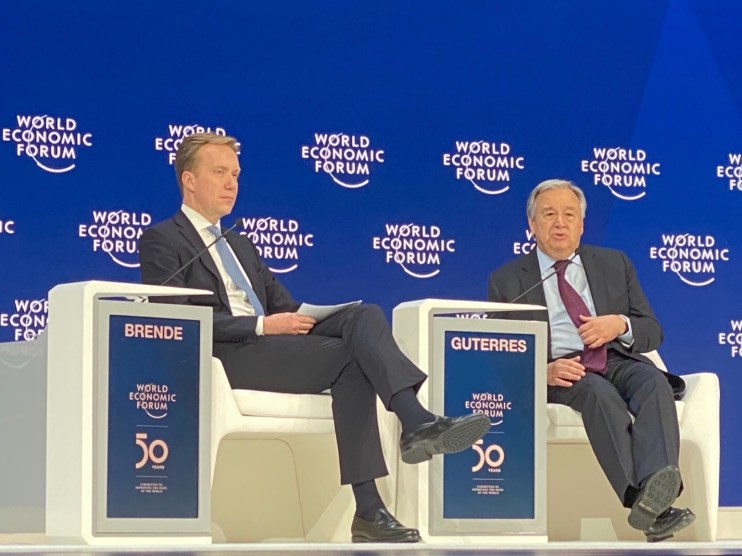Davos Diary: Day 4

Today I woke to another bright and crisp day in the Swiss Alps. My first port of call was a session with Satya Nadella, CEO of Microsoft. He was tight-lipped on the hot story of the day – the alleged hacking of Jeff Bezos’s mobile by the Saudi Crown Prince – saying he would need to look at the details. But he did talk about the importance of public trust for tech firms, as they become holders and controllers of more and more data.
“We will go backwards unless there is trust in the factor of production that is supposed to fuel the Fourth Industrial Revolution,” he told the audience. It’s easy to empathise. Think Cambridge Analytica, facial recognition software, and countless data losses. The confidence which people have in companies to handle their data in a sensitive and trustworthy way is going to be a key differentiator in the 2020s.
I then went to hear the Green prime minister, Kyriakos Mitsotakis, talk about future trade between the European Union and the US, the ongoing conflict in Libya (as Greece has a very substantial stake in the refugee crisis) and the prospects for his economy at home. Mitsotakis is a well-connected pol – his father was prime minister, his younger brother was foreign minister and his nephew is mayor of Athens – but a stark contrast to his predecessor, the younger leftist Alex Tsipras. He made it clear that Greece could not accept the EU agreeing to a political solution in Libya unless the November agreement between Libya and Turkey was annulled. Dialogue is essential but I was reminded of the power of age-old suspicion and hostility.
The third meeting of the day was a discussion of the Arab Spring revisited, with Hussain Sajwani, chairman of property giant DAMAC, and the Dutch foreign trade minister Sigrid Kaag, elegantly moderated by Hadley Gamble of CNBC. It seems incredible but the first crackle of hope which the Arab Spring represented came to life nearly a decade ago, and seemed to herald so much change. Across the Maghreb and the Levant, it looked like democracy was on the march, people seizing control of their destinies from autocrats and out-of-touch rulers. Social media played a huge part, and it felt at the time like a genuinely popular movement.
The optimism of the Arab Spring was swallowed up by the chaos in Egypt and the horrors of the civil war in Syria. But the discussion sought to find positive elements from what has happened. What lessons can we draw? How can we find a “roadmap for positive change” from the embers? I have to believe that change can still come, but as the blood continues to flow in Syria, and Iraq remains unstable, it is hard to stay optimistic.
Next came a session with the UN Secretary General, António Guterres, who gave a special address. He said that climate change will not destroy the planet – but that it would destroy our capacity to live on it, adding that there are “clear indications that we absolutely need to change course”. Tonight, there is a dinner for European leaders to discuss the continent’s future, an issue of pressing concern with Brexit looming within a week or so. If I’ve learned anything, it’s that conferences like Davos are not for the faint-hearted! The hours are long and the interaction relentless. But it’s also an opportunity to meet power brokers and policy makers which has no equal.